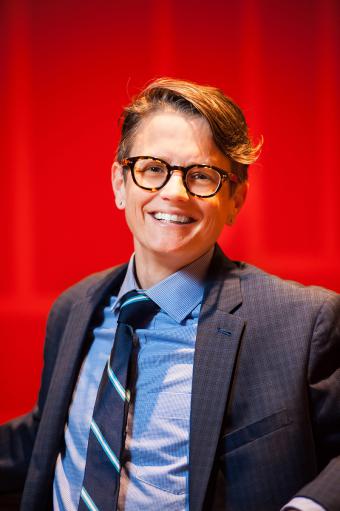A Creative Room of One's Own
I talk about this all the time with students. What I impart to them is that they should never assume that they can predict what experiences will teach them the most about what they value, or about what their life should be.— Ruth J. Simmons, president of Brown University.
I had a friend in graduate school who was an emergency room physician. At that time, I was seriously contemplating upending my pursuit of a cultural studies Ph.D. in favor of medical school. I wanted to be an emergency room doctor. Maybe this was because I was a product of the long-running television drama, ER, and maybe it was because I loved the idea of the heroics of it—the high stakes and drama, crash carts and ambulances, and the sense that speed and diagnostic acumen could make the difference between whether someone lived or died. I asked my friend if I could tag along sometime while he was at work and so he took me on a twelve-hour overnight shift. I wore blue scrubs and he introduced me to patients as a visiting colleague. It was thrilling. I stood on the outskirts as the medical team triaged a stab wound victim for surgery, sent a schizophrenic to the psych ward, and treated a skier who had taken a pole to the eye. When the night was over, though, I went back to work on the dissertation. I realized two things from that night: that to suddenly shift gears, though possible, would take years of training that I wasn’t ready to commit to—intellectually or financially—and that there was a big difference between theoretical pain and suffering and real blood and gore. Too many germs for my squeamish sensibilities. Let me drag the emergency room metaphor out a little longer. The rehearsal room is the room I ended up choosing and it functions in ways strangely similar to the ER.
- Outside the rehearsal room there’s a huge waiting area filled with scores of people leaking blood and need, burning up with ambition fevers who want to get in and can’t figure out why the wait is so long. Highly trained directors, dramaturgs with Ivy League degrees, playwrights with deserving plays, visionary designers, and actors galore all think they should undoubtedly be next in line to finally get the treatment they deserve.
- The gatekeeper who seems responsible for deciding who goes next, who probably gets free meds and had her education paid for, looks like she just got out of school, and is blocking the doorway with her indifference so those dying outside to get inside can’t even get a glimpse of the ever more powerful and all-knowing career-providers locked in somewhere. She’s part of the phalanx of interns and literary assistants who read a lot of scripts and fetch a lot of coffee.
- As those in the waiting room feel like they are inching closer to finally being seen, an ambulance arrives and a more critical, dare we say, more important patient, bypasses the line and gets seen right away. This is usually some recent graduate of a hot MFA program, suddenly knighted as the next great…who needs immediate attention and resources.
- Those inside the rehearsal room look out at the waiting hordes and are certain that at least half that room is filled with hypochondriacs, folks parading as artists but not really good enough, who should just quit their whining and go home.
- The insiders are also convinced that what is happening inside that rehearsal room is life and death. The wrong prescription, wrong diagnosis, the wrong decision or choice could pile up the bodies and bring about a malpractice suit by an offended critic and end a career.
I find the apt nature of this comparison disturbing on many levels. The narrow focus of our industry on that one room, that sacred rehearsal room where productions are made, careers are launched, and blood is shed is as dangerous to our field as is the emergency room as singular focus of the healthcare industry. We’re all familiar with the story of how a) expensive it is to treat people in an ER; the costs are wildly higher than preventive care, and b) it tends to be the disadvantaged who lack health insurance and primary care physicians who find themselves in the ER waiting rooms hoping to be seen.

Preventative care for theater practitioners starts with believing that creativity and imagination have to be rooted in all of the activities that surround that rehearsal room—a series of concentric circles where we learn artistic practice through emphasizing skills that can happen in all sorts of places, not just a rehearsal room.
Yes, I’m suggesting that we create within our field a preventive care system to avoid a bunch of impoverished, suffering artists cramming themselves into an ever-larger, ever-more-indifferent waiting room.
Preventative Care for the Theater
Rethinking mentorship
I do a lot of mentoring of up and coming theater artists. And perhaps if you’re looking for a mentor you should avoid me, because I don’t believe mentorship means throwing people into the rehearsal room as the highest form of learning. That approach is much like my twelve-hour stint in the ER. It was fascinating to watch, but it by no means prepared me to perform emergency, life-saving procedures. I’ve seen some blood and gore over the years in the rehearsal room that no untrained trainee should be responsible to triage.
And yet, all I hear from aspiring practitioners is “How do I get into the room?” “Can I sit in?” “Can I give notes?” I get it. I understand the drive to learn through witnessing. And of course there is value to being in the room! But if this is all that making theater is about, guess what? The waiting is just going to get longer and longer as we train more theater makers for a small and perhaps dwindling number of rooms where they can practice.
And what learning does go on by observing rehearsal happens when we find authentic ways to teach on our feet. Good medical training allows for interns to dip their toes in first doing smaller procedures and then working toward major surgery (I’m kind of making this up, as this knowledge mostly comes from watching ER). Internships and mentorship, in general, should be less about being in proximity to more experienced practitioners in a state of indentured servitude, and more like a residency model, where serious learning happens gradually and through real responsibilities that include actively participating in the creative process. We have too many interns in this field fetching coffee or just sitting idly in the room and then writing on their resumes that they assisted on this show or that workshop.
Telling the truth
Preventative care for theater practitioners starts with believing that creativity and imagination have to be rooted in all of the activities that surround that rehearsal room—a series of concentric circles where we learn artistic practice through emphasizing skills that can happen in all sorts of places, not just a rehearsal room.
Communication, for example, requires immense amounts of training and creativity. When I’m mentoring, I talk about communication as the single most important skill to cultivate. How can I create opportunities for aspiring theater practitioners to learn simple things, like how to tell the truth about their experience of the art? In fact, lying is one of the very first things we inadvertently teach because we’re conflict avoidant when it comes to truthful conversations with each other about the work. I’ve been in many rehearsal rooms where an actor or a playwright walks out the door and then people start saying what they really think as interns look on. Interns learn by example how not to talk to artists. I’ve started wondering if this kind of mentorship breathes into the earliest moments of a career the sense that dishonest communication is just part of the job.
How do you communicate honestly with an artist about their work? I hate it when seeking advice from a doctor and she either can’t take a stand or just tells me what to do with no time for explanation. The question I always ask when making any health decision is, “What would you do if you needed this procedure or medication or…?” This feels straightforward to me. A doctor in considering her own treatment would inevitably contextualize that advice in a considered assessment of past experience with other patients. That’s the honest advice I seek. As a theater maker, I ask myself this same question when communicating with artists. It’s slightly rephrased, less about what I’d do and more about how I would want to be treated or talked to. And I’m certain I wouldn’t want to be told what to do to make me feel better—change this, cut this character, say the line this way. But I am just as certain that I would want another seasoned practitioner’s best sense of my work contextualized in years of practice with other artists. Watching a pro talk to artists often means hearing long stories of the successes and failures of past productions. Learning how to communicate with artists, to have honest exchange about the work in ways that are productive and nuanced and generous, takes a lifetime of training.
Teaching something like the creative art of communication—how to engage truthfully in this field about who we are, what we want, and what we think—won’t happen by launching ourselves or launching young practitioners into the blood and gore of the rehearsal room of some high-pressured regional theater. It will require, instead, finding alternative rooms and experiences where skills can be cultivated and tested.
Some Ideas About Rooms
In a recent interview with Ruth J. Simmons, the president of Brown University, she says about learning, “So my lesson to my students is you have to be open and alert at every turn to the possibility that you’re about to learn the most important lesson of your life.” I love this sentiment—the idea that living, being open to experience, getting out in the world, being less driven about a particular path, is the most effective way to cultivate a life. I’d take that a step further and say it’s the only way to be an artist. A few more ideas:
- Consider another room. I have a playwright friend who is just leaving on a journey to Antarctica to be a janitor on a science base. His next step could have been to wait for the next production, the next rehearsal room, but instead he’s choosing the janitor’s closet and unknown geography. He’s on a quest for rooms that will ultimately make his stories more expansive and his productions when they happen, even more powerful.
- If you love what you do and express that wherever you are, doors will open. Recently I discovered my new favorite idea for a room for learning to make art watching tUnE-yArDs: Tiny Desk Concert. What if every aspiring theater artist clamoring to make his or her way into a rehearsal room just created a theater at the desk of their day job? Forget about being invited into the concert hall, into the rehearsal room, rock out your creativity in the space available to you. Love this! Quit waiting to be invited to a theater to be a theater artist.
- Making a virtual room. Every Tuesday @HowlRound we hold a “weekly howl” on Twitter for an hour. Tweet Deck is one of my favorite rooms these days for learning to communicate. It’s truncated and wildly imperfect and yet in the limited space of 140 characters, a bunch of us build a room for conversation each week, a place where artists can hone skills talking to each other. Join us at 3 p.m. EST every Tuesday, follow #newplay. The door is always open.
So consider for a moment what it might mean to widen your notion of the rehearsal room and to aspire to a more holistic model of building a solid foundation for better artistic health. What would a room where you can work, where you can participate with your best creative self look like? It has to be more comfortable than the waiting room at the ER. Have you ever sat in an ER waiting room? The seating sucks, the fluorescent lighting makes everyone look even sicker than they are. Your waiting room should be the very best production of your creative self that you can imagine. The rehearsal room must be viewed as a part of a larger system and the work we do in it will be greatly enhanced by concentric circles of generative and comfortable spaces where we don’t even notice that we’re waiting. These new rooms might extend the health of our artistic careers and save our lives.













Comments
The article is just the start of the conversation—we want to know what you think about this subject, too! HowlRound is a space for knowledge-sharing, and we welcome spirited, thoughtful, and on-topic dialogue. Find our full comments policy here
Good read. Thank you! I work with a lot of young playwrights and actors (ages 18 and under) and it is interesting to apply these ideas to that work. Generally speaking, the theatre experiences that young people typically have emulate the very path to which you are speaking. So I wonder not only about how I might form a room of my own, but how to assist in the construction of a room, or rooms, for these young people, too. What impact, if any would that have on the young people, or on our own work? Perhaps that might even be the beginning of a paradigm shift?
Thank you Polly.
I think we’ve all been or felt in the room and we’ve all been or felt outside of the room. And many of us have needed to create the room if we’re not invited in. Sometimes, for me, the room is my chair, alone at home. Other times it’s the rehearsal room or a chair on the stage talking to an audience. Of course being out of the room is when a theatre rejects my play and then I might as well be lying in a ditch.
What Lisa Timmel said about what Jose Rivera advised her I think is extremely important and useful, and I also have found, working with college students writing plays, that (sometimes) telling them (those I think who are eager to hear) directly how a scene or series of scenes seem(s) to work or not work and why can make the more talented and receptive and tenacious of the writers come back with a draft that blows my mind (this happened last week. I lay awake, heavy with guilt at the bluntness of my critique only to find that the playwright addressed all the concerns and took the piece to a whole new very exciting place that was entirely his.) And for me, when a colleague is blunt and direct, it can be illuminating. I guess crucial in the equation is trust and respect.
I had a very good experience at the Goodman this year. Or maybe it started last year. Anyway, Tanya Palmer liked a play of mine enough to give me a call and so began a series of conversations about it which included questions she had and questions I had and the flutter of excitement a writer sometimes feels when one’s work (which of course comes from some deep place that intersects with one’s identity) is seen. Anyway, the conversations turned into a reading last winter and then this fall a workshop production, and I found, because I felt that Tanya was truly “receiving” the play that I meant to be writing, that I myself could become more critical and demanding of the play—and she “received” that too—as one of her dramaturgical methods perhaps, which includes as someone who was truly engaged in the process. That was gold for me.
And: it’s interesting how there seem to be two general groups or conversations here, one about what it is to be an artist in this world, and the other about how to be an institution (and of course these groups sometimes overlap and converge.)
Polly,
My mother has been an ER nurse for about 40 years now. When I was little I essentially grew up in an Emergency room, hanging around there, waiting for my father to get off work and come pick me up and take me home. I couldn't agree more with this metaphor and have a desire to take it even further.
To take the idea of all these artists on the outside of the emergency room as patients and those inside the nurses and doctors is awesome. When I was little, I think around 7, I got bored of coloring in the nurses lounge and decided to wander. I wandered into patients rooms and started chatting to them. About nothing serious, but how they were doing, where they were from, did they have kids, did they want to see a drawing I made, did they want me to draw something for them. Seeing a kid in the room with the patients the nurses would walk in and pull me out (as they should have, I could have caused a serious law suit), but what this did was then the nurses were checking in with the patients more often. Making sure they were ok, making sure that they knew that the "Institution" thought of them and was concerned not just with getting them out the door, but making sure that their stay was comfortable and that they were getting care.
Its a good reminder for Institutions to remember that they are the "caretakers" of these "patients" in their "wards"
This metaphor is also a harsh reality to some, and maybe an important one. In that "Care" or the ability to work with others, costs money. And that not everyone can afford "Healthcare" or "Out of Pocket" costs to work with the best in the business. It costs a lot more for the Institution to provide care then it is for the patient to do preventative care. So what is preventative care for artists? Is that mentorship? Is that self promotion? Self Creation? Is that building your own "Hospital" so that you can learn and grow? Is that going back to Med School? Or is it everyone hoping they can become Doogie Howser? I don't know...but they are all good questions and the ideas your pose in your piece are also great question starters.
Thanks Polly for this thoughtful piece. And many thanks for the great presentation at CUNY last night (which led me to this essay!) Generous and expansive and hopeful and smart.
Polly,
I just wanted to let you know that every post you write here on Howl Round seems to have a big effect on me. I love the way you think about theatre and I love the way you write about it.
I love the very important idea of making sure that whatever room one finds oneself in becomes a creative space even if that room does not at first look like a good fit. As an off-Broadway baby, I've learned more than I could have hoped working in a large regional theater (especially since they are so often characterized in very popular theater books and blogs as being soul-crushing, artistic black holes. But I digress).
I do take issue with the characterization of mentoring in the theater. Having done my internships and mentored many dramaturgs and playwrights over twenty years, I don't recognize the intern fetching coffee and sitting idly by as an industry-wide problem. Nor can I think of a reputable theater company that puts unqualified people in charge of determining who gets in the door or what happens in a rehearsal room. That's not to say that it never happens, but I am not convinced it's the norm (certainly I have had my failures but they were of the human variety and not systemic) or that it is not the nature of entry-level work. If it is an endemic problem, it won't get solved unless we name names. But that seems unlikely in a small, interconnected field like ours, so we all get tarred by the same brush.
I am beginning to feel that in order to make a proactive point or any point at all, we recite reflexively this collectively constructed narrative of our failures as an industry. Of the many mentorship moments I had as a young dramaturg, one that stands out is Jose Rivera teaching me how to give notes to a playwright. He told me to always lead with the positive, with what is working and to ignore what I thought were problems. The praise would work far more effectively in the long run because we all want to earn praise. It was great advice and I have found it works on interns, playwrights, artistic directors, children, dogs, etc. We could use his advice in our own self-talk about who we are and what we do.
Good read. Obviously I am one of those young people clamoring for more time in the room (for better or for worse). I have found that I've learned most of my communication skills by directly observing rehearsal rooms. Both things to stay away from and things to always practice. Also, I've tried to find my own rooms. I do wonder how young artists can create these rooms in a vacuum. At the very least, observing other rooms give you a place to start. Building a room with no foundation seems wasteful.
I'd be interested in hearing more of what an internship residency would look like. Like program structure. How would it be laid out? What are the steps towards the end? What is the end result? How does the resident receive feedback? Could we, as a field, develop a program that can be repeated and widely reproduced? Or do we run the risk of having more bodies EVEN more anxious to jump into these rooms.
One of the reasons I left science was because there was such a narrow, predictable path available to me: Ph.D. --> postdoc --> assistant professorship --> tenure track, and so on. As if my whole life were already planned out for me. The idea that a playwright's life must also be overdetermined (I guess it goes something like: theater major --> MFA --> New York theater writers group --> New York theaters --> fame and glory) makes me laugh. Why did we become artists in the first place? So that we could let someone else determine our life path? I certainly didn't; I became an artist, in part, so that I could wholly determine my own life path. I consider it part of my creative work.
Here's my "room"! It's pretty wonderful: http://monicacatherine.word...
When I look at our profession as a story teller - in my mind asserting that the job is only to bring the story to the audience, personally and clearly - then a lot of the wind in the trees of our industry hushes for me. In that head space, each audience is valuable, size and location less important, each path to it possible. I was on a panel at Juilliard recently with 2 other directors, and the road to the profession could not have been more different for each of us. And rooted, it seemed to me, in unexpected turns of our personal curiosities. Accidents. Let's all spend a day looking at the whole board! What if we forget about career paths? What would we do with our year? Maybe our best stories lay hidden in that answer....
POLLY CARL goes very well with morning coffee.
Joanna Settle
Artistic Director
Shakespeare on the Sound
That's much the same reason why we have #2amt, except the doors never close.
And thinking of making a theatre of your desk put me in mind of Scotty Iseri's delightful web series, Scotty Got an Office Job, which started almost exactly that way.
http://scottygotanofficejob...
For my part, I haven't worried about getting into anyone else's rehearsal room. I've made my own rooms and have been lucky enough to be invited into others as a result. Most important of all, I've put work out for audiences who've responded and grown. To me, it's all just an exercise until they're in the room with us.